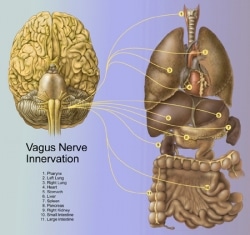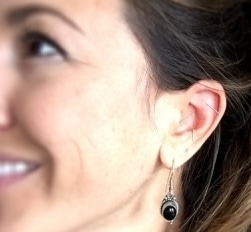Your Vagus Nerve, Ruler of Relaxation
Published on December 13, 2015 by Dr. Caitlin Gordon
 What is the vagus nerve?
What is the vagus nerve?
The vagus nerve is the longest of the cranial nerves and has fibers spanning from your brain stem to all your organs. Like a vagabond (where the name comes from), it wanders all over your body. It is the command center of your parasympathetic nervous system and controls your ability to relax and recover from stress.
Your vagus nerve can be strengthened like a muscle by stimulation, or weakened by a lack of stimulation. You can have an under-active vagal response or an over-active response. Weak vagal nerve tone is associated with depression, heart attacks, loneliness, and inflammation.
What does the vagus nerve do?
More specifically than just controlling your body’s relaxation response, the vagus nerve performs a number of important functions:
- Connects Gut to Brain Emotionally
- Your vagus nerve in your GI tract sends messages to your brain. That “gut feeling” is a very real phenomenon. This study shows that innate anxiety and learned fear in rats is regulated by signals from the gut.
- Helps with Memory
- Studies on both rats and humans have shown that stimulating the vagus nerve helps strengthen and consolidate memories. Promising news for those suffering cognitive decline and neurodegenerative conditions like Alzheimer’s.
- Reduces Inflammation
- This is a big one! Incredible research by neurosurgeon Kevin Tracey demonstrated that nerve stimulation by electrical implants caused a drastic reduction in symptoms and even remission in rheumatoid arthritis patients. Similar studies have been done showing dramatic improvement in a number of inflammatory responses and diseases throughout the body.
- Relaxation Response
- The vagus nerve tells the body to calm down by releasing acetylcholine. This chemical prompts a number of other chemicals like oxytocin, vasopressin, and prolactin to be secreted. As a result: the heart rate slows down, breathing calms, you feel more able to bond and connect with others, digestion is stimulated, and muscles relax.
- Fun fact: mercury blocks acetylcholine. Mercury toxicity is an increasingly common problem due to mercury in our natural resources (water, air, food), and amalgam “silver” dental fillings. You can have your heavy metals levels checked through blood, urine, and hair tests, but the best indication often comes from your health history and symptoms.
- Breathing and Heart Rate
- The vagus nerve impacts these two very important functions directly. It controls your heart rate via electrical impulses and tells your lungs to breathe through acetylcholine secretion.
Signs your vagus nerve is weak

Vagal nerve signals can become weak or the nerve can become irritated due to heavy metal toxicity, poor posture, Hiatal hernias, excess alcohol, stress, and brain trauma (a single concussion can cause weak vagal nerve tone). Signs of weak vagal nerve tone or misregulated firing of the vagal nerve can cause the following symptoms:
- Lack of a gag reflex
- Slow digestion– food sits in your stomach too long. This can cause acid reflux or GERD, bloating, or constipation.
- Inability to relax
- Heart palpitations
- Insomnia
One of the best signs of a strong vagal tone is when your heart rate increases slightly with inhalation and slows slightly with exhalation.
How do you strengthen the vagus nerve?
About 60% of vagal nerve tone is determined by genetics, but there is a solid 40% that we can impact! Learn a number of ways to strengthen and stimulate the vagus nerve.
Fun fact: you CAN overstimulate the vagus nerve, and this is the most common cause of fainting. If you’ve ever fainted or felt light-headed after giving blood or getting a shot, you likely experienced “vasovagal syncope”. When you are under very high stress your vagus nerve becomes too stimulated and your heart rate drops quickly causing you to feel woozy or lose consciousness. It’s only temporary, and sitting or lying down usually resolves the feeling quickly. No damage has been done, so don’t worry!
Weak vagal nerve tone is linked to inflammation, depression, loneliness, and heart attacks. We want to make sure our vagal nerves are strong! The following all stimulate the vagus nerve just enough to be very therapeutic, but not so much to cause fainting–as these are not highly stressful events.
-
-
- Gargling
- Gargling helps stimulate the vagus nerve, although dainty gargling won’t do it. You need to gargle loudly and aggressively, to the point of almost gagging. Doing this daily will help increase the responsiveness of your vagal nerve to regulate relaxation, digestion, metabolism and more.
- Playing instruments
- Fascinating research with didgeridoos showed that playing the instrument is effective in treating obstructive sleep disorders and sleep apnea through its strong stimulation of the vagus nerve. Further research shows that a number of inflammatory conditions also improved. Most wind instruments stimulate the vagus nerve.
- Deep Breathing
- Holding your breath for 6-8 counts stimulates the vagus nerve. Try this: Use your belly to breathe in for a count of 6, hold for 6-8, and exhale slowly through pursed lips for 6-8 counts to get your vagus firing. It’s important to be able to feel your diaphragm (that line between your stomach and ribs) moving up and down with each breath. It takes about 10 minutes of this breathing to feel the deeply relaxing effects of the vagal nerve stimulation.
- Meditation
- Learning loving-kindness meditations improves vagal tone. This is due to its effect on positive emotions and positive connections. There more positive emotions and connections we have, the stronger our vagal tone. Download my free meditation handout. Or try this guided meditation.
- Acupuncture

- Acupuncture is amazing for helping to regulate vagal nerve response. At my office, I’ve developed a very effective technique using electroacupuncture on specific ear and body points that stimulate the vagus nerve to strengthen tone and regulate vagal response. Electroacupuncture uses a small machine that emits a painless electromagnetic pulse. The electromagnetic pulse feels like a slight buzzing or tapping and is not unpleasant. After 20-30 minutes of this, you will leave the office feeling incredibly relaxed. That vagal nerve stimulation will help regulate all the processes controlled by the vagal nerve, which by now you know is a big deal! Can you spot the acupuncture points in the photo above?
- Bioelectronics is an emerging field of medicine in which small devices are implanted to stimulate different nervous system pathways. This successfully treats a range of diseases and inflammatory symptoms. This is very exciting and very validating of acupuncture–which uses needles and sometimes electricity to stimulate the nervous system at different points to treat a range of diseases and inflammatory symptoms. If you want to be on the cutting edge of scientific research, and avoid surgery to implant a metal device– try the less invasive way, acupuncture.
For more ways to stimulate vagal nerve function, download my free PDF guide
- Gargling
-
Sources:
Can the Nervous System Be Hacked? NY Times Article
9 Nervy Facts about the Vagus Nerve
Function of the Vagal Nerve
The Vagus Nerve and Memory
Rheumatoid Arthritis and Vagus Nerve Stimulation
Didgeridoo Playing Cures Sleep Apnea through Vagus Stimulation
Vagus Nerve Stimulation in Major Depression
The Neurobiology of Grace Under Pressure
Nerve Treatment When Drugs Fail -WSJ on vagus nerve






